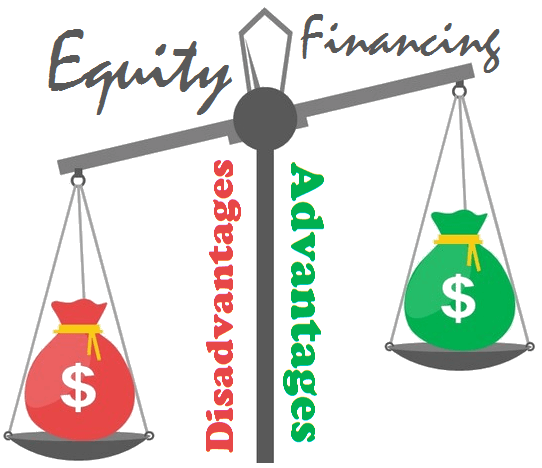Permanent solution for raising finance is through Equity Financing. Before jumping one should very well understand the advantages and disadvantages of equity financing. There are numbers of equity financing pros and cons you should know prior to applying for equity finance.
Advantages and Disadvantages of Equity Financing
It’s a way toward raising capital through the offering an equity share of your company. Equity financing can be more appropriate for some organizations rather than taking loan from bank or institutions. But it may not be the same case for other companies. Let us today focus on taking knowledge on advantages and disadvantages of equity financing.
Advantages of Equity Financing
Let us look at the advantages of equity financing or you can say pros of equity financing.
Focus on Your Product Rather than Finance
Equity financing is the changeless answer for finance needs of an organization. No organization’s principle objective or target can be money management, as organization cannot spend all the time looking after finance and loans periodically.
A product base company will have a goal of delivering outstanding products to the customers or consumers. Equity finance gives that benefit to concentrate on high quality product and services. It keeps business administration teams far from the raising funds again and again by approaching various financial institutions or moneylenders.
Less Overhead
When obtaining equity financing, there is no loan to payback with interest. In early stage, business feels relief from fewer burdens as they do not need to make a month to month loan installment. This can be especially important factor to consider if the business doesn’t generate profits during initial stage.
No More Credit Issues
When applying for the loan, there are chances that you need good credit rating. In case of poor financial record of the business then the best and reliable option would be to take advantages of equity financing rather than applying for debt financing.
Get Talent and Skills
With equity financing, you may shape your partnership or large company with more skilled and experienced people. Some better talents may be all around you. Assuming that your business could get profits and benefits from skilled and business communities.
You can Anytime Apply for Loans
When an organization is highly financed by equity, then major equity stakeholders has all the control over money related matters as well as business strategies and planning. A bank or some other moneylenders require an organization to contribute approximately 20 to 25% by equity to finance other 75 to 80% obligation. Lower equity finance companies have higher growth rate and smooth business operations which intern is easier for acquiring of debt finance during need.
Disadvantages of Equity Financing
Let us look at the disadvantages of equity financing or you can say cons of equity financing.
Profits are Shared
Your financial institutions or investors will expect some share from business profit. It could be an advantageous exchange as well, that you are profiting from the cash they bring or potential business experience and skills.
Loss of Control
There is a cost to pay for equity financing and the majority of its potential advantages that your investor provides to your business. You will have to share the control of your business which seems to be biggest disadvantages of equity financing.
Costly Way of Raising Fund
Equity finance is thought to be the most expensive way of fund raising when compared with debt finance. The undeniable reason is the higher required rate of come back from equity shareholders. Since investing through equity shares is a high-risky investment, financial investors will obviously expect a higher rate of return.
Flotation Cost
Financing through equity is the most tedious and troublesome method for fund raising. It require a follow huge numbers of statutory compliance and also various costs like charge of a merchant financier, underwriting fees, brokerage, guaranteeing charge, and bunches of other fees as expenses.
Underwriting of Shares
When applying for initial public offer (IPO), the organization regularly requires an appoint of underwriters. The activity of a underwriters is to expect the risk of membership. Financiers would consent to subscribe the offers to an agreement in-case not subscribed by the public offering and will charge an expense for that administration. The charge might be as paid in advance or might be a equity shares on the discounted rate.
Arising Conflict
Sharing proprietorship and working with others could prompt nearly pressure and even clash in the ideas, growth, and administration style and for business operations. It can be an issue to one has to consider. Many owners of the companies leave in frustration when they fail to consider this disadvantage of equity financing at the earlier stage.
Conclusion
By now you should be very much aware of the advantages and disadvantages of equity financing. Now you can decide by yourself whether these pros and cons of equity financing are fine with your organization or you would still prefer to look for debt finance. Hope this article helped you and given you the great knowledge on our advantages and disadvantages of equity financing topic. Do share your feedback and rating, if you liked our article.
Read E-Learning Tutorial Courses - 100% Free for All
Basics of Debt Financing and Equity Financing for Beginners
- Chapter 1: What is Debt Financing with Examples?
- Chapter 2: Types of Debt Financing
- Chapter 3: Sources of Debt Financing
- Chapter 4: Advantages and Disadvantages of Debt Financing
- Chapter 5: What is Equity Financing with Examples?
- Chapter 6: Types of Equity Financing
- Chapter 7: Sources of Equity Financing
- Currently Reading: Advantages and Disadvantages of Equity Financing
- Chapter 9: Debt Financing vs Equity Financing – Advantages and Disadvantages
- Chapter 10: Debt Financing Quiz – Equity Financing Quiz - Questions and Answers







